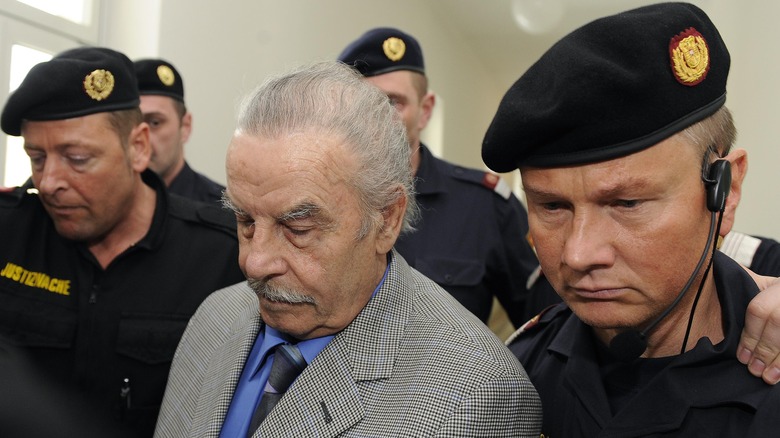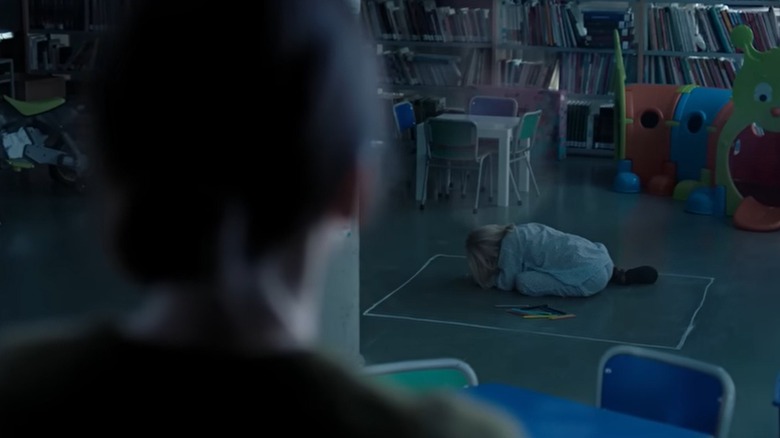Movies Inspired By The Disturbing True Story Of Josef Fritzl
Austria's second most notorious villain after Hitler, Josef Fritzl has generated enough nightmare fuel to inspire a number of movies. To say the subject matter is sensitive would be quite an understatement — and each subsequent adaptation has attempted to handle the topic in a different manner.
In one of the most shocking abuse cases in history, Fritzl locked up his daughter Elisabeth for 24 years, subjecting her to rape and abuse and forcing her to give birth to seven of his children. He was only caught when one of their adult children grew very ill in captivity and had to be taken to hospital. Some of the details of Elisabeth's confinement are so disturbing they scarcely bear repeating, but that hasn't stopped directors from fashioning Fritzl's crimes into on-screen drama. The story of Elisabeth's life has gone on to inspire the critically acclaimed "Room," a book-turned-movie that draws heavily on the case — as well as the lesser-known flicks "Girl in the Basement" and "The Chalk Line." Each film draws on the events of the Fritzl case to tell a very different story.
Girl in the Basement
Lifetime's 2021 movie "Girl in the Basement" is a loose retelling of the events that took place in the Fritzl household. The names of the people involved have been altered — Josef Fritzl is now "Don," and Elizabeth Fritzl is now "Sara" — and the setting has been changed to the U.S., but the basic situation is mostly the same. Sara also makes several daring escape attempts during the course of the movie, which serve as the main drama for the narrative but did not occur in reality.
As in the case of the real-life Josef, in the film, Don tells his wife that his daughter has run away after he secretly locks her up in his basement prison. Years pass, and we witness Sara give birth to her father's children in a harrowing retelling of the dark events that took place in Austria. To give the audience some relief from the unending misery of the movie, the writers invented a fictional boyfriend for Sara, who provides the character with some sort of happy ending after she escapes her ordeal. The film scored an unfavorable 59 percent audience score on Rotten Tomatoes, and the narrative still winds up being pretty horrifying — even with some artistic license to soften the story.
Inspiration for Room
It is debatable how closely "Room" was inspired by the Josef Fritzl case, but the parallels are pretty obvious. The 2015 film is an adaptation of a book of the same name, and unlike "Girl in the Basement," it was pretty universally praised. Rather than simply subjecting the viewer to several hours of abuse on screen, the film spotlights the strength of a mother-child relationship formed in unimaginably horrific circumstances. In the film, Ma (Bried Larson) and her son Jack (Jacob Tremblay) are locked up together in a shed (rather than a basement), and much of the story is told from little Jack's naively innocent point of view.
Despite (or perhaps because of) the book and film's huge success, "Room" has faced its fair share of criticism due to its association with the Fritzl story. Author Emma Donoghue, who wrote both the book and the movie, was accused of engaging in vulture-like cynicism for crafting the tale. In an interview with The Guardian, she reassured her detractors that it was not her intention to profit off abuse victims and that her story is only loosely based on Fritzl. "I'd say it was triggered by it," she said. "The newspaper reports of Felix Fritzl [Elisabeth's son], aged 5, emerging into a world he didn't know about, put the idea into my head. That notion of the wide-eyed child emerging into the world like a Martian coming to Earth: it seized me."
Netflix's The Chalk Line
Spanish thriller "The Chalk Line," which appeared on Netflix in 2022, is also based on the Fritzl kidnapping — although most aspects of the case have been radically altered. Its original title, "Jaula," literally means cage in Spanish, which should give you some idea of how disturbing the movie's events are. In this version of the story, the upsetting abduction narrative is relayed back to the audience as a sort of mystery after a young couple finds a distressed girl on the road. By the end of the film, we discover that the young girl, Clara, is the daughter of Ingrid, a woman held captive by the movie's villain, Eduardo. After abducting Ingrid — who unlike Elisabeth Fritzl is not related to her kidnapper — Eduardo subjects her to eight years of abuse and eventually kills her.
In this adaptation, the young girl's PTSD is the central focus, and the film explores how the events profoundly affect Clara's psyche. To demonstrate her mental anguish, Clara draws a box made of chalk on the floor and refuses to step outside of it for much of the movie.

